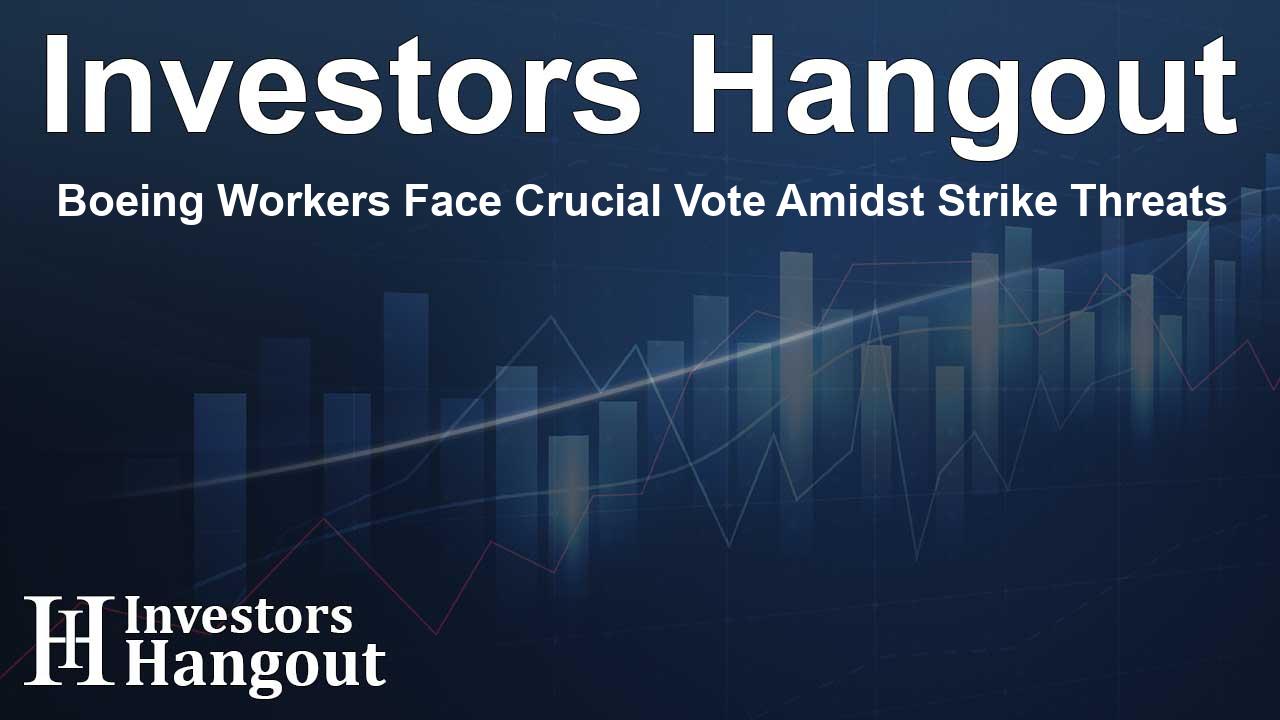Boeing Workers Face Crucial Vote Amidst Strike Threats

Boeing Workers Face Crucial Vote Amidst Strike Threats
Boeing is currently navigating a turbulent situation as more than 30,000 workers approach a critical voting period, with a strike looming over Seattle-area production facilities. Workers are seeking a greater pay increase than the agreed 25% over four years, which has led to growing tensions.
The Challenges Faced by Boeing Employees
The workers' union, the International Association of Machinists and Aerospace Workers (IAM), represents Boeing’s workforce along the U.S. West Coast. Under IAM regulations, a supermajority is necessary for the workers to initiate a strike, raising the stakes for this voting process.
The Voting Process Explained
To understand the intricacies of this situation, let’s delve into the voting procedure. Employees will participate in a two-part ballot: initially, they will decide whether to accept or reject the current contract offer. The secondary question involves their support for a strike.
Should a majority opt to accept the proposed contract, it becomes automatically binding. Conversely, should the workers reject it, a second criterion must be met for a strike to occur.
What is Required for a Strike to Commence?
To embark on a strike, it is essential for a majority of Boeing workers to reject the contract while simultaneously attaining at least two-thirds support for a strike. This high bar is set to ensure strong backing before taking such a significant step.
Potential Consequences of Rejection
If the majority votes against the tentative agreement but fails to secure the necessary two-thirds majority backing for a strike, the agreement will stand accepted by default. Such a scenario has led to questions regarding the union's effectiveness in representing the members' interests.
Historical Context of Contract Ratification
Historically, contracts that receive majority support but fall short of strong support, often lead to uneasy situations for workers. In an instance from 2002, members at a Kansas Boeing plant faced a similar predicament, ratifying a contract with less than 40% backing. This serves as a reminder that the dynamics around contract negotiation can sometimes lead to unfavorable outcomes for employees.
Why Such Striking Thresholds?
The IAM insists on a rigorous standard for initiating strikes, arguing that a simple majority would undermine their ability to negotiate effectively. They believe that having two-thirds support is crucial to ensure the strength of their actions during a strike.
They state, “Going into a potential strike without overwhelming support may weaken our position at the bargaining table.”
Strike Pay and Its Implications
For those concerned about financial stability during a strike, union members can expect to receive $250 weekly from the strike fund once the strike begins. This benefit serves to mitigate the financial risks associated with withholding labor.
Upcoming Voting Timeline
The voting process commenced early, with polls opening on Thursday morning. Employees will have until the afternoon to cast their votes, and the results are slated to be announced later in the evening.
Should the voting outcome favor a strike, workers could commence actions as soon as Friday, ushering in a significant shift in the labor dynamics within Boeing.
Frequently Asked Questions
What happens if the workers approve the contract?
If a majority of workers vote to accept the proposed contract, it will be enacted immediately.
How does the strike pay support workers?
Once a strike is underway, union members will receive $250 weekly from the strike fund to help cover living expenses during the strike period.
What is the IAM's reasoning for a two-thirds majority to strike?
The IAM believes that having a strong majority support is crucial to ensuring a successful strike and thus powerful negotiation leverage.
What was the key issue in the previous contract negotiations?
The main point of contention lies in the proposed 25% pay increase, which many workers feel is inadequate given current economic pressures.
When can workers expect to know the outcome of the vote?
The results are expected to be announced on Thursday evening, following the closure of the polls.
About The Author
Contact Hannah Lewis privately here. Or send an email with ATTN: Hannah Lewis as the subject to contact@investorshangout.com.
About Investors Hangout
Investors Hangout is a leading online stock forum for financial discussion and learning, offering a wide range of free tools and resources. It draws in traders of all levels, who exchange market knowledge, investigate trading tactics, and keep an eye on industry developments in real time. Featuring financial articles, stock message boards, quotes, charts, company profiles, and live news updates. Through cooperative learning and a wealth of informational resources, it helps users from novices creating their first portfolios to experts honing their techniques. Join Investors Hangout today: https://investorshangout.com/
The content of this article is based on factual, publicly available information and does not represent legal, financial, or investment advice. Investors Hangout does not offer financial advice, and the author is not a licensed financial advisor. Consult a qualified advisor before making any financial or investment decisions based on this article. This article should not be considered advice to purchase, sell, or hold any securities or other investments. If any of the material provided here is inaccurate, please contact us for corrections.
